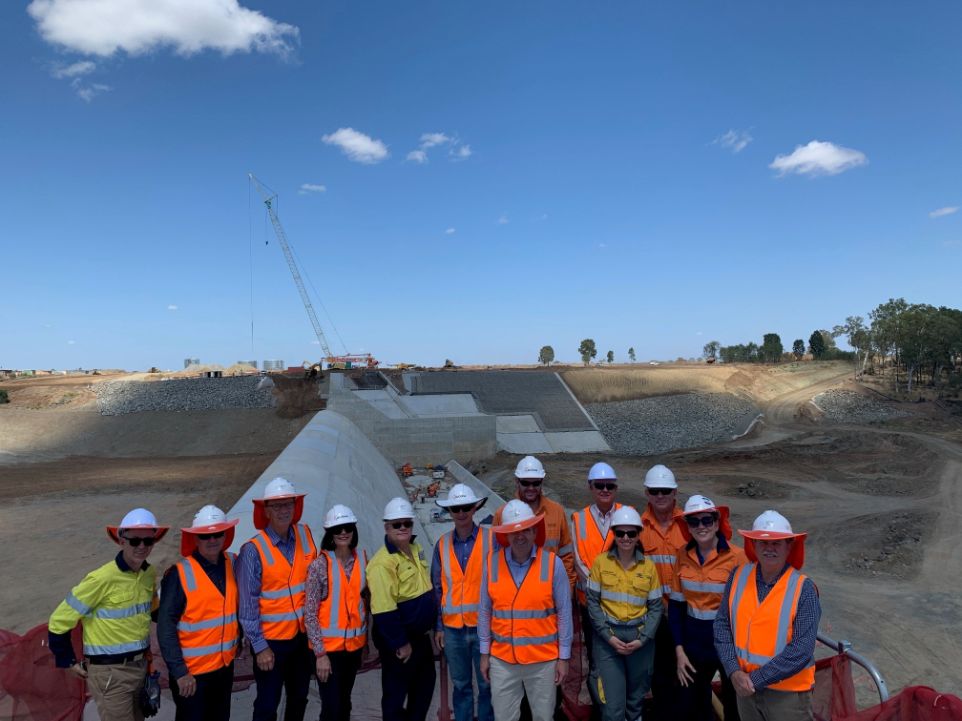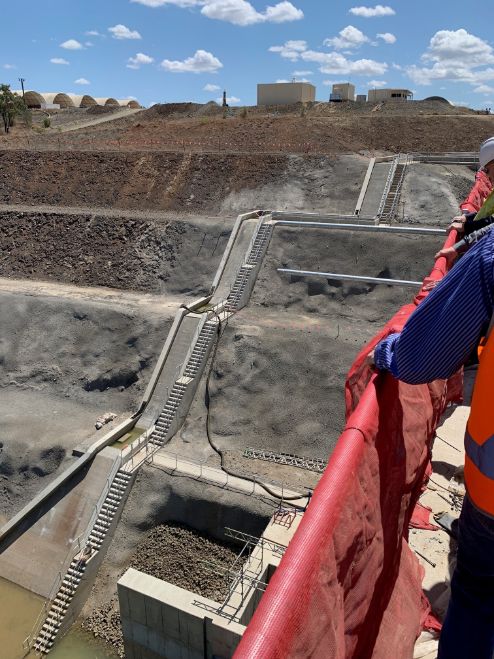Rookwood Weir illustrates how richer countries can better protect the environment
Personal reflections on a tour of Rookwood Weir by Adept Economics Director Gene Tunny
The nearly finished Rookwood weir on the Fitzroy River in Central Queensland illustrates how wealthier countries can afford to look after the environment better than poorer countries. It is a good example of why calls for ‘degrowth’ should be rejected.
On Friday 20 October, I was fortunate enough to attend a site visit at Rookwood Weir hosted by Sunwater, the Queensland Government’s rural water business, which commissioned the weir. You can check out Capricorn Enterprise’s write up of the site visit here: Rookwood Weir site visit | Capricorn Enterprise. The weir should be finished by the end of the year.

Rookwood Weir site visit. Adept Economics Director Gene Tunny is front row, centre. Thanks to Capricorn Enterprise for the photo and to Sunwater for hosting the excellent tour of the worksite.
The day before, I had presented on the economic outlook at the Capricorn Enterprise Major Projects Forum in Rockhampton. My presentation to the Forum is available here: Business Event Presentations | Capricorn Enterprise.
At the Forum, Sunwater representative Jay Merritt gave an excellent presentation on the progress of the weir’s construction. Alas, it has run around $200 million over budget, a 55% overrun, so what was supposed to be a $367 million project is now a $568 million project (see Cost blow outs for Rookwood Weir). The Government has blamed the pandemic, the weather, and rising construction costs across the economy for the huge cost overrun. So the economic viability of the project, already questionable according to the project’s business case, is even more in question, but we’ll put that to one side for this article. Of course, its taxpayers across the State who ultimately will pay for the cost overruns, and the project will no doubt help regional farmers who are already preparing fields for new plantings of macadamia trees and other high-valued crops.
What really fascinated me about Rookwood Weir were the extraordinary efforts Sunwater has undertaken to minimise the environmental impacts. The features that stood out to me were the fish lock and turtle movement ramp. The team at Capricorn Enterprise have done a good job describing these features:
“Sunwater’s Jay Merritt hosted the tour and provided insights into the innovative engineering techniques that were used to build the weir, as well as the environmental safeguards developed to protect the river and its ecosystems. This includes the fish lock, a first-of-kind multi-level mechanical fish passage with features for effective fish attraction, and the turtle passage, supporting movement of six species, including critically endangered White-throated Snapping Turtle and vulnerable Fitzroy River turtle.”
These features have added a large undisclosed amount to the cost of the project, but are essential for allowing fish and turtles to move along the river. Sunwater is really concerned about the colony of turtles, and it has individually tagged hundreds of turtles to understand their movements (see Rookwood Weir turtle monitoring program to help protect local species – Sunwater).
The turtle ramp appears well thought out, assuming it actually works, and it has several resting ponds for the turtles along the way, so they can break up their climb of the weir wall in times of low river flow (see the image below).

Turtle ramp with resting ponds at under construction Rookwood Weir.
The fish lock and the turtle ramp at Rookwood Weir show the high willingness to pay for environmental protection in wealthy countries like Australia. Broadly speaking, wealthier countries have a higher willingness and ability to pay for environmental protection than poorer countries. This is one reason I disagree with the degrowth movement, which is pushing for large reductions in GDP and hence living standards as a way to avoid what it sees as the catastrophic threats of climate change and ecological collapse. Of course, countries with higher GDPs will generally have higher greenhouse gas emissions, even though emissions per unit of GDP may be lower. We still need to decarbonise over the coming decades, but richer countries are better placed to bear the costs of mitigation and to adapt to climate change.
I recently summarised my thinking on degrowth in a paper for the Centre for Independent Studies (CIS), where I’m an adjunct fellow. The paper is titled Debunking Degrowth. As a classically liberal think tank, the CIS naturally would be opposed to degrowth, which would require authoritarian measures to implement.
After the publication of my paper on degrowth, the CIS held an event at its Macquarie St HQ in Sydney on 26 September featuring a leading US economist, the so-called ‘Grumpy Economist’ Professor John Cochrane of the Hoover Institution, on the topic ‘Free to Grow.’ I interviewed John after his talk and moderated the Q&A session at the event. You can watch the whole thing on YouTube:
On degrowth, I had a good conversation with Oliver Hartwich from the New Zealand Initiative on its podcast and I also published the audio on my own podcast: Growth or Degrowth? w/ Oliver Hartwich, NZ Initiative – EP208.
Published on 30 October 2023. This article was prepared by Adept Economics Director Gene Tunny. It is also published on his personal Queensland-focused blog Queensland Economy Watch. For further information, please get in touch with us via contact@adepteconomics.com.au or by calling us on 1300 169 870.